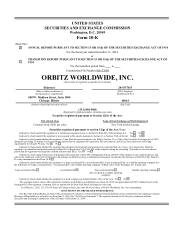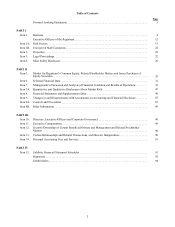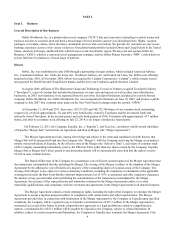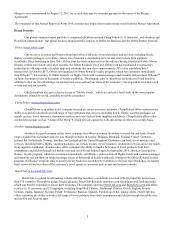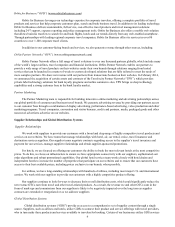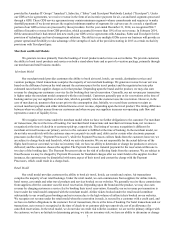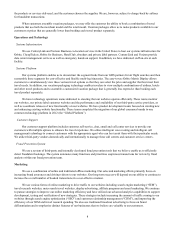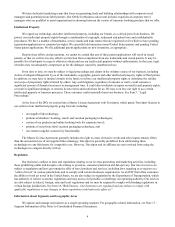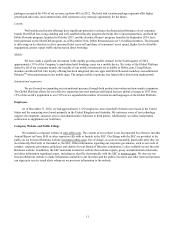Orbitz 2014 Annual Report Download - page 7
Download and view the complete annual report
Please find page 7 of the 2014 Orbitz annual report below. You can navigate through the pages in the report by either clicking on the pages listed below, or by using the keyword search tool below to find specific information within the annual report.7
provided by Amadeus IT Group (“Amadeus”), Sabre Inc. (“Sabre”) and Travelport Worldwide Limited (“Travelport”). Under
our GDS service agreements, we receive revenue in the form of an incentive payment for air, car and hotel segments processed
through a GDS. These GDS service agreements may contain minimum segment volume commitments and require us to make
shortfall payments if we do not process the required minimum number of segments for a given year. As a result, a significant
portion of our GDS services are processed by these providers. For the year ended December 31, 2014, we recognized $94.7
million of incentive revenue from GDS providers, which accounted for more than 10% of our net revenue. In February 2014,
Orbitz announced that it had entered into new multi-year GDS service agreements with Amadeus, Sabre and Travelport for the
provision of technology and travel management solutions. The ability to use multiple GDSs across our business will provide us
greater operational flexibility to take advantage of the strengths of each of the providers starting in 2015 as certain exclusivity
provisions with Travelport lapse.
Merchant and Retail Models
We generate revenue primarily from the booking of travel products and services on our websites. We provide customers
the ability to book travel products and services on both a stand-alone basis and as part of a vacation package, primarily through
our merchant and retail business models.
Merchant Model
Our merchant model provides customers the ability to book air travel, hotels, car rentals, destination services and
vacation packages. Hotel transactions comprise the majority of our merchant bookings. We generate revenue for our services
based on the difference between the total amount the customer pays for the travel product and the negotiated net rate plus
estimated taxes that the supplier charges us for that product. Depending upon the brand and the product, we may also earn
revenue by charging our customers a service fee for booking their travel reservation. Generally, our net revenue per transaction
is higher under the merchant model compared with the retail model. Customers generally pay us for reservations at the time of
booking and we pay our suppliers at a later date, which is generally when the customer uses the reservation. However, in the
case of merchant air, payment often occurs prior to the consumption date. Initially, we record these customer receipts as
accrued merchant payables and either deferred income or net revenue, depending upon the travel product. The timing difference
between when we collect money from our customers and when we pay our suppliers increases our operating cash flow and
represents a source of liquidity for us.
We recognize net revenue under the merchant model when we have no further obligations to the customer. For merchant
air transactions, this is at the time of booking. For merchant hotel transactions and merchant car transactions, net revenue is
recognized at the time of check-in or customer pick-up, respectively. The timing of revenue recognition is different for
merchant air travel because our primary service to the customer is fulfilled at the time of booking. In the merchant model, we
do not take on credit risk with the customer since we are paid via credit card, debit card or certain other electronic payment
processors (collectively, “Payment Processors”), while the Payment Processors collects funds from the customer; however, we
are subject to charge-backs and fraud risk, which we actively monitor. We are not responsible for the actual delivery of the
flight, hotel room or car rental; we take no inventory risk; we have no ability to determine or change the products or services
delivered; and the customer chooses the supplier. The Payment Processors transmit payment for the reservation within one to
two days of the booking date. The Payment Processors take on the risk of collecting funds from the customer. We are subject to
fraud because we may be charged by Payment Processors for fraudulent charges after we remit funds to the supplier. In other
instances, the customer may be dissatisfied with some aspect of their travel and contest the charge with the Payment
Processors, which could result in a charge-back.
Retail Model
Our retail model provides customers the ability to book air travel, hotels, car rentals and cruises. Air transactions
comprise the majority of our retail bookings. Under the retail model, we earn commissions from suppliers for airline tickets,
hotel rooms, car rentals and other travel products and services booked on our websites. We generally receive these commissions
from suppliers after the customer uses the travel reservation. Depending upon the brand and the product, we may also earn
revenue by charging customers a service fee for booking their travel reservation. Generally, our net revenue per transaction is
lower under the retail model compared with the merchant model. Airline tickets booked under the retail model contribute
substantially to our overall gross bookings and net revenue due to the high volume of airline tickets booked on our websites.
We recognize net revenue under the retail model when the reservation is made, is secured by a customer with a credit card, and
we have no further obligations to the customer. For air transactions, this is at the time of booking. For hotel transactions and car
transactions, net revenue is recognized at the time of check-in or customer pick-up respectively, net of an allowance for
cancelled reservations. In the retail model, we do not take on credit risk with the customer; we are not the primary obligor with
the customer; we have no latitude in determining pricing; we take no inventory risk; we have no ability to determine or change

